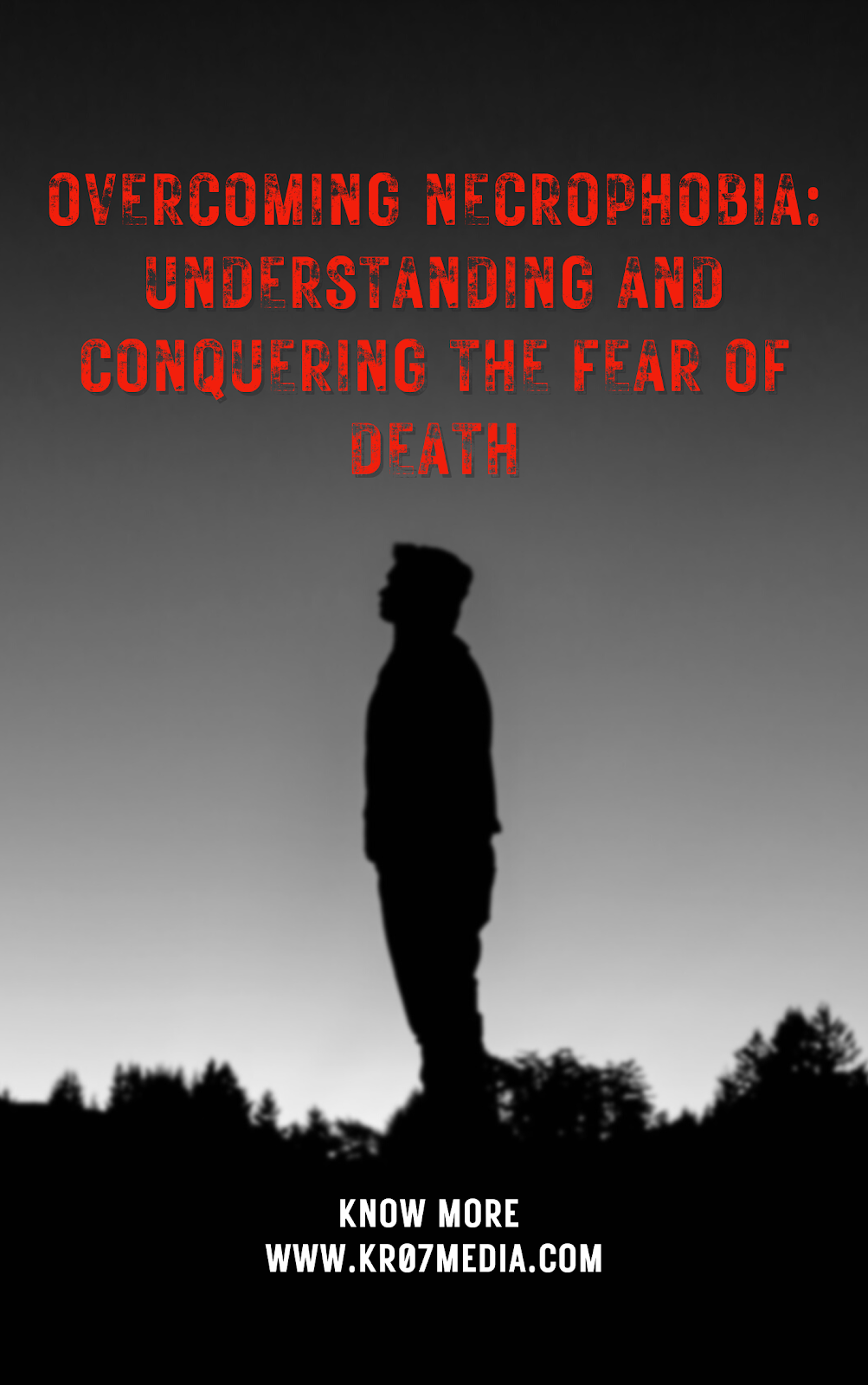Introduction:
Necrophobia, the fear of death or corpses, is a relatively common and deeply rooted anxiety disorder that affects numerous individuals around the world. While it is normal to feel some level of fear or apprehension when confronted with the idea of death, necrophobia is an extreme and irrational fear that can significantly impact a person's quality of life. This article aims to shed light on necrophobia, exploring its causes, symptoms, and potential treatments, while providing guidance on how individuals can overcome this paralyzing fear.
Understanding Necrophobia:
Necrophobia is characterized by an overwhelming and persistent fear of death, dying, or dead bodies. People with necrophobia often experience intense anxiety, panic attacks, or even a full-blown phobic response when exposed to death-related situations, such as funeral homes, cemeteries, or discussions about mortality. The fear may stem from various factors, including personal experiences, cultural or religious beliefs, existential concerns, or traumatic events.
Symptoms of Necrophobia:
The symptoms of necrophobia can manifest both mentally and physically.
Individuals suffering from necrophobia may experience:
Intense anxiety or panic attacks when confronted with death-related stimuli.
Avoidance of situations or discussions related to death or corpses.
Rapid heartbeat, shortness of breath, or trembling when exposed to death-related triggers.
Sweating, nausea, or dizziness.
Obsessive thoughts about death or dying.
Disturbed sleep patterns or nightmares.
Overcoming Necrophobia:
Although necrophobia can be deeply ingrained, it is possible to overcome this fear through various therapeutic approaches. Here are some strategies that can be helpful:
Education and Awareness:
Learning about death and understanding the natural process of dying can demystify the fear surrounding it. Reading books, attending support groups, or seeking guidance from mental health professionals can provide valuable knowledge and insights.
Gradual Exposure Therapy:
Gradual exposure to death-related stimuli can desensitize individuals to their fear. Under the guidance of a therapist, individuals can gradually confront their fear, starting with less anxiety-inducing situations and gradually progressing towards more challenging scenarios.
Cognitive Behavioral Therapy (CBT):
CBT can help individuals identify and challenge negative thoughts and beliefs associated with death. By replacing irrational thoughts with more rational ones, individuals can reframe their perspective on death and develop healthier coping mechanisms.
Mindfulness and Relaxation Techniques:
Practicing mindfulness and relaxation techniques, such as deep breathing exercises, meditation, or yoga, can help manage anxiety and promote a sense of calm when confronted with death-related triggers.
Support Networks:
Joining support groups or seeking support from friends, family, or online communities can provide individuals with a safe space to express their fears, share experiences, and gain support from others who may be dealing with similar anxieties.
Professional Help:
If necrophobia significantly impacts an individual's daily life or causes distress, seeking professional help from a mental health expert, such as a psychologist or psychiatrist, is essential. They can provide personalized guidance, therapy, or medication if necessary.
Conclusion:
Necrophobia, the fear of death or corpses, can be a debilitating anxiety disorder that affects numerous individuals. However, by understanding the root causes, recognizing the symptoms, and seeking appropriate treatment, individuals can gradually overcome this fear and lead fulfilling lives. With the help of therapeutic interventions, education, support networks, and personal determination, individuals can conquer necrophobia and develop a healthier relationship with the concept of death, enabling them to embrace life more fully.
In conclusion, overcoming necrophobia, the fear of death, is a deeply personal and complex journey that requires understanding, empathy, and self-reflection. This fear, although common, can have a significant impact on an individual's quality of life, preventing them from fully engaging with the present and embracing the inevitability of mortality.
To conquer necrophobia, it is crucial to first understand the root causes and underlying factors that contribute to this fear. For some, it may stem from traumatic experiences, cultural or religious beliefs, or a fear of the unknown. By delving into these origins, individuals can gain insight into their specific fears and begin to challenge and reframe their perspectives.
Education and information play a vital role in overcoming necrophobia. Learning about death and the dying process, exploring different cultural beliefs and rituals, and discussing the topic openly with trusted individuals can help demystify death and alleviate some of the anxiety associated with it. It is important to remember that death is a natural part of the human experience, and understanding its inevitability can foster acceptance and peace.
Additionally, seeking professional help from therapists or counselors who specialize in anxiety disorders or phobias can provide valuable support in overcoming necrophobia. Therapeutic techniques such as cognitive-behavioral therapy (CBT) or exposure therapy can assist individuals in challenging their irrational thoughts and gradually confronting their fears in a controlled and supportive environment.
Building resilience and cultivating a sense of meaning and purpose in life are also integral to overcoming necrophobia. Engaging in activities that bring joy, connecting with loved ones, and participating in spiritual or philosophical practices can help individuals develop a broader perspective on life and death. Embracing the present moment and focusing on personal growth can lead to a greater sense of fulfillment and reduce the fear of death's inevitability.
Ultimately, overcoming necrophobia is a journey of self-discovery and personal growth. It requires a willingness to confront fears, challenge deeply ingrained beliefs, and cultivate acceptance of the inherent uncertainties of life. With patience, support, and a commitment to personal development, individuals can gradually overcome their fear of death and live more fully in the present.



